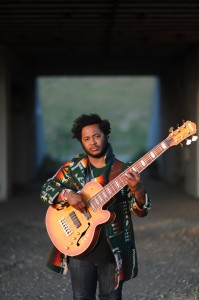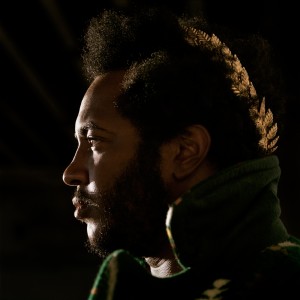Multi-genre bass virtuoso Stephen “Thundercat” Bruner take the stage at the BUKU Music + Art Project 2014 this weekend. Here is an exclusive Q&A with the dynamic young bass player covering his influences, his experience playing in New Orleans, and his musical version of the apocalypse.
Why the bass? How did you journey to the place you’re in now, career-wise?

Photo Credit: B+
“That’s like asking me why I’m a boy. Or why I have a beard. It just is. It’s me. I don’t know. I mean, I used to play violin a little too, and I studied upright bass for a little while. But I just remember moments where [the bass guitar] became more intense, it pulled emotion out of me.”
What have you been listening to lately?
“Heatwave, Animals As Leaders, Kenny Loggins, composed works… Henry Mancini, Stravinsky, this guy Eric Whitacre — he’s this dope choral conductor. I was blown away by this piece I heard, the Brigham Young University Singers or something. But Heatwave, really getting into Heatwave right now.
In your experience, what is the difference between playing to a jazz fest crowd versus a young electronic music fest audience? Or is there no difference?
“Well, jazz fest crowds are definitely more difficult. There’s all this pressure when playing those gigs, like they want you to really impress them. It’s like people expect there to be only certain patterns (at jazz festivals). There’s more freedom at the other festivals — still an emotional connection, but not so much over-thinking, more relaxed. But the thing is, the electronic music crowd is the the jazz crowd of now. They’re the new open minds, they’re looking for something new, like jazz crowds used to be. It’s just a little more judgmental in the jazz crowds now. They’re both cool though, both types of festivals are based on the same concept really. Everything has the potential to isolate itself over time I guess.”
Your music definitely bridges the gap between the worlds of jazz and electronica, sort of melding jazz fusion and modern funk with dubstep and psychedelia. What do you feel your role is in the evolution of these various scenes?
“I don’t really play a role. I’m just inside it, a part of it. It’s all a part of pop culture.”
Have you been to New Orleans before?
“Yeah, on tour with Erykah [Badu]. We played Jazz Fest and, or Voodoo Fest or something. I just remember someone offering me moonshine once.”
Are there any New Orleans artists that have inspired you, or that you are particularly fond of? Anyone you might want to collaborate with?
“Jay Electronica. Yeah man, Jay Electronica. He’s got the illest lyrics and I just dig how he deals with people too.”
Anyone else?
“Terence Blanchard. The dude’s amazing. He’s jazz-awesome.”
Jazz giants Stanley Clarke and George Duke have been huge influences on you, yeah?
“Ya think? I mean, I covered a George Duke tune on my first album.”
Tell us about that track. “For Love (I Come)” right?
“Yeah. That was like, my version, my interpretation — it was my way of saying thank you, you know? To show him how much his music has inspired me, but also to show him that it’s evolved into now… and still resonates with the younger generation.”
Did he get to hear your version before he passed away last year? (New Orleans Jazz Fest 2013 with Clarke was one of his last performances)
“That’s a funny story… one day I was hanging out with Erykah [Badu] in L.A. and we were talking about George and she was like, ‘you don’t know George Duke.’ But my brother (Ronald Jr.) was playing drums with George at the time and so we knew where he lived, and I remember running up on his house like ‘yo George, Erykah doesn’t believe you know me.’ We kinda bum-rushed him. But I’m glad I did it because that was the time I played my “For Love” for him. It was crazy because, at first he didn’t recognize it — he was like, ‘that’s nice, what is this?’ And I said, ‘that’s your track man!’ We played it again and then he heard it. He seemed really happy. And now he’s gone, so I’m grateful to have had that opportunity.”
And Duke’s longtime music partner, Stanley Clarke, you’ve actually played and toured with him, yes?
“Yeah. I talk to Stanley almost every day sometimes. It’s just really dope to be able to have that sort of relationship with one of your icons, with a mentor. He always wants to check in, wants to know what’s going on with the shenanigans in our young crew’s worlds.”
Has he told you any stories from back in his heyday?
“Oh yeah. I’ve heard so many stories. Like when they would box rounds with Muhammad Ali and stuff. How Ali and them would go for 70 rounds instead of 12 like everyone else.”
Who is the George Duke to your Stanley Clarke?
“Oh you already know the answer to that one.”
So what’s next in the pipeline for you?
“Well, [Flying] Lotus’ new album of course. That’s coming out soon. And probably my next album after that. Hopefully some orchestral compositions. Maybe a Street Fighter jazz album. Ok, just kidding, maybe not that one.”
Both your first and second albums are themed around the Apocalypse. First The Golden Age of Apocalypse, and last year just Apocalypse. Are we living in the apocalypse now?
“It smells like it. No, but I mean, there is just no end to how stupid people are getting, you know? Have you seen [the film] Idiocracy? That just about sums it up.”
What does the apocalypse look like?
“A Twinkie wrapper.”
What does the apocalypse sound like?
“A symphony sung with a choir of cockroaches and Vienna sausages.”
[iframe width=”100%” height=”166″ scrolling=”no” frameborder=”no” src=”https://w.soundcloud.com/player/?url=https%3A//api.soundcloud.com/tracks/91014703&color=ff5500&auto_play=false&hide_related=false&show_artwork=true”]
Thundercat brings his band to Mardi Gras World on Saturday, March 22 for his debut set at the third annual BUKU Music + Art Project. BUKU Fest 2014 takes place March 21-22 at 1380 Port of New Orleans Place. Single day and weekend tickets range from $90 – $170 for GA, or $210 – $400 for VIP. For daily line-up schedules and online ticketing, visit www.thebukuproject.com.




